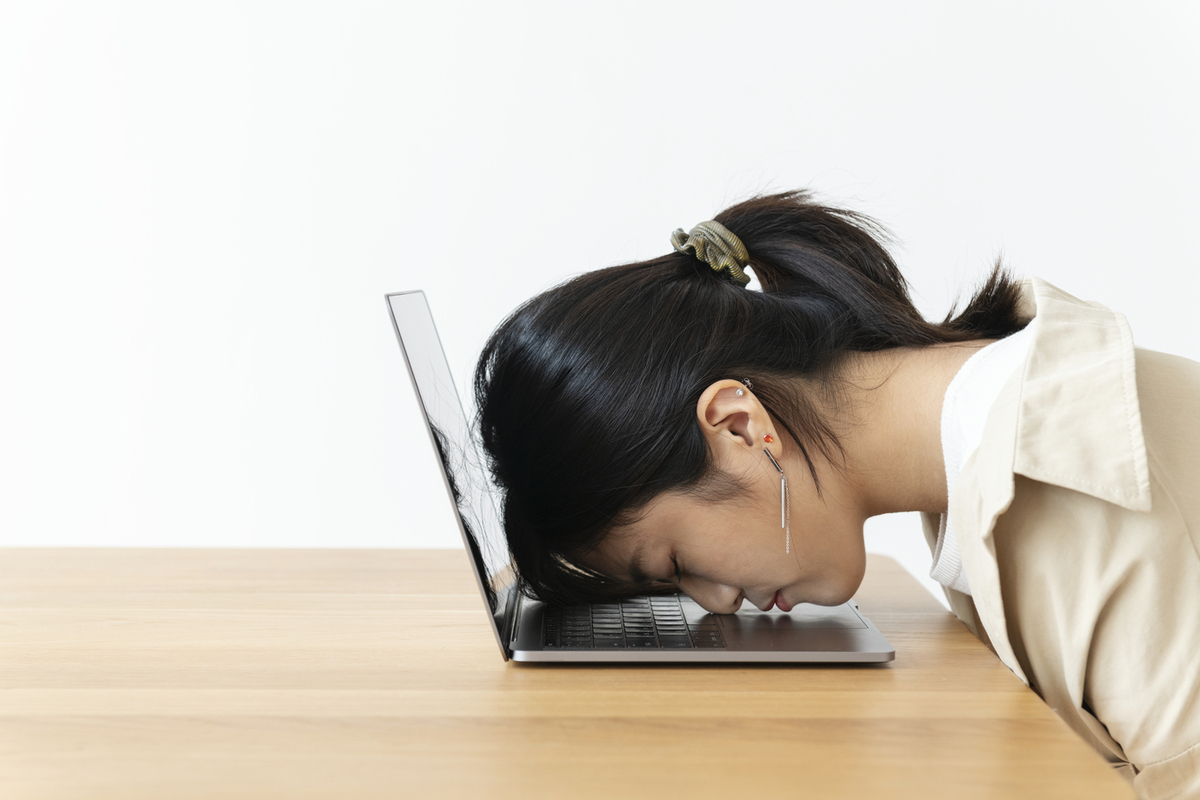As working from home has grown in popularity since the advent of the COVID-19 pandemic, research has indicated that work/life balance is increasingly non-existent. As a result, more and more workers feel overwhelmed to the point of "insanity". Mental and physical wellbeing suffers, and soon, job-related dread has taken over your entire life.

You feel demotivated. Nothing excites you any longer. Every day is a chore. You don't have any compelling reason to actually want to get out of bed, and you're on autopilot the entire time. Your productivity might just be high enough to get by, but you're definitely not feeling it any more.
What Is Burnout? What Symptoms Should You Pay Attention To?
You won't find burnout listed anywhere in the DSM-5, the all-important "psychiatry Bible" created by the American Psychiatric Association — but the term, which the psychologist Herbert Freudenberger came up with back in the 1970s, is still clinically recognized. The World Health Organization, for instance, explicitly describes burnout as an "occupational phenomenon" as opposed to a mental health condition.
The officially-recognized symptoms of job-related burnout are very simple, and we'll quote the International Classification of Diseases, 11th revision, in full here:
- feelings of energy depletion or exhaustion;
- increased mental distance from one’s job, or feelings of negativism or cynicism related to one's job; and
- reduced professional efficacy.
The ICD-11 adds that "burnout refers specifically to phenomena in the occupational context and should not be applied to describe experiences in other areas of life".
The fact that so many people found themselves relating to the concept of burnout means that the term has taken on different meanings over time. Now, some of the most popular health websites on the internet describe the supposed symptoms of burnout in a much broader way.
The Mayo Clinic, for instance, asks workers who thinks they may have become burned out whether they practically have to drag themselves to work, dread getting started, and find themselves irritated and impatient with the people they interact with at work. Trouble concentrating, an inability to be productive, feeling incredibly dissatisfied and disillusioned, altered sleep patterns (sleeping more or having trouble achieving a restful night's sleep), and using alcohol to cope with work-related stress are other burnout symptoms they list.
Ultimately, this begs the question — is burnout, in fact, simply Major Depressive Disorder caused by your job?
What Are the Symptoms of Major Depressive Disorder, and Do They Differ from Burnout Symptoms?
If you know that your job is sucking the life out of you, it is — despite the fact that many publications will tell you that burnout can be hard to identify — easy to jump to the conclusion that you are dealing with work burnout. Before you do, though, honestly examine the symptoms of major depressive disorder as well.
People can be diagnosed with major depressive disorder if they've consistently been experiencing the following symptoms for at least two weeks:
- A depressed mood, which is typically described in more detail as feelings of hopelessness, helplessness, "emptiness" or "numbness", or sadness. In some people, sadness instead manifests as irritability or aggression.
- A lack of interest in activities that used to be meaningful.
- Spontaneous weight loss or gain.
- This is connected to the appetite changes that also accompany depression; some people overeat when they are depressed, while others don't feel like eating at all.
- Insomnia or oversleeping nearly every day.
- Physically being restless or slowing down, phenomena clinically called psychomotor agitation or retardation.
- Fatigue and low energy, most days and nearly every day.
- Feelings of worthlessness and guilt, inappropriate to the situation you're in.
- Trouble concentrating.
- Thoughts about death and dying. These can include active suicidal thoughts, but also thoughts that your suffering would end if you suddenly had an accident, for instance. It's important to note that suicidal ideation isn't the only possibility here.
Burnout and depression can differ in one very important way. If your feelings of existential doom, dread, and demotivation are limited to work, and you can still live a full and happy life — looking forward to enjoyable activities, laughing, enjoying food and company, being intellectually curious — outside of work, you almost certainly have burnout.
If, on the other hand, work is clearly the center of your personal apocalypse but you're not able to enjoy anything anymore, ever, and you tick at least five of the boxes above (and have for at least two weeks), you're more likely to be suffering from clinical depression. Your work situation might have triggered it, but the depression now engulfs your entire life.
Why does the distinction matter? A few simple reasons come to mind.
Folks who are dealing with burnout may still require treatment, benefiting from psychotherapy, sometimes medication, and definitely a good long break, but they're likely to start feeling a whole lot better immediately after their work situation improves. These people primarily need a break, and ideally a new job after that break.
People with clinical depression need talk therapy, and sometimes antidepressants, to get better. A break from work will definitely benefit them, but a new job won't send their symptoms packing.
- journals.sagepub.com/doi/pdf/10.1177/2158244017697154
- journals.sagepub.com/doi/abs/10.1177/2167702620917447
- www.who.int/news/item/28-05-2019-burn-out-an-occupational-phenomenon-international-classification-of-diseases
- www.gallup.com/workplace/336941/wellbeing-engagement-paradox-2020.aspx
- onlinelibrary.wiley.com/doi/full/10.1111/joim.12752


Your thoughts on this